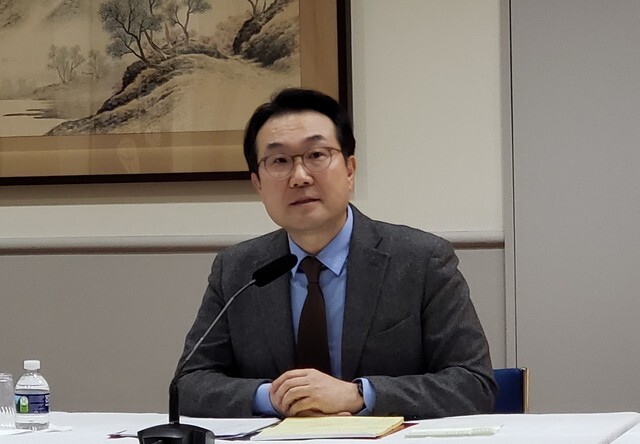hankyoreh
Links to other country sites 다른 나라 사이트 링크
US reaffirmed its support for inter-Korean cooperation, Lee Do-hoon says

The US government has reaffirmed its support for efforts to improve inter-Korean relations, Ministry of Foreign Affairs Special Representative for Korean Peninsula Peace and Security Affairs Lee Do-hoon said.
The remarks rebutted speculation that Seoul and Washington are at odds on the South Korean’s government’s plans to actively pursue inter-Korean cooperation projects such as individual tourist visits to North Korea. In addition to speeding up its discussions with the US, the South Korean government also plans to coordinate with neighboring countries like China to encourage a positive response from Pyongyang.
Lee spoke to reporters at the US Embassy in Washington on Jan. 17. He held discussions with US Deputy Secretary of State and Special Representative for North Korea Stephen Biegun on Jan. 16 with Korean-related officials in the US government earlier on Jan. 17.
“We reaffirmed the US government’s support for efforts to improve inter-Korean relations,” Lee said of his discussions with Biegun.
“We also agreed on South Korea and the US cooperating closely with regard to inter-Korean relations and the complete denuclearization of and establishment of permanent peace on the Korean Peninsula,” he added, signaling that Seoul and Washington had reaffirmed the principle of working to improve inter-Korean relations while maintaining international sanctions against the North.
“These are the words we agreed to share with reporters after the conclusion of my discussions with Mr. Biegun,” Lee said.
The discussions came amid what appeared to be negative signals from the US after South Korean President Moon Jae-in announced at a New Year’s press conference on Jan. 14 that he planned to actively pursue inter-Korean cooperation efforts alongside dialogue between Pyongyang and Washington. Speaking with the foreign press on Jan. 16, US Ambassador to South Korea Harry Harris said, “In order to avoid a misunderstanding later that could trigger sanctions [. . .] it’s better to run this through the [South Korea-US] working group.” His remarks were interpreted as a threat in response to the pursuit of individual tourism, prompting across-the-board criticism from the Blue House, the ruling Democratic Party, and the Ministry of Unification.
The US government was also reported to be making efforts to smooth over the feathers ruffled by Harris’ remarks. Senior-level figures in Washington reportedly communicated to South Korean government officials that their actual intentions may have been “misrepresented” due to Harris’ plain-spoken style. This means that there is also support within the US government for respecting the South Korean government’s sovereign decisions when it comes to inter-Korean relations. The focus of Lee Do-hoon’s recent US visit has been on explaining about the need to generate a “driving force” for North Korea-US dialogue through progress in inter-Korean relations, while ensuring that the US is not sending a different message on Seoul’s pursuit of inter-Korean cooperation efforts.
With the US expressing “support for improving inter-Korean relations” after its previous focus on slowing Seoul’s roll and insisting that inter-Korean relations need to proceed “in tandem with the denuclearization of the Korean Peninsula,” the South Korean government is viewing itself as having gained more room to maneuver. But an in-depth discussion process will be needed for the two sides’ agreement on the broader direction of improving inter-Korean relations to progress toward actual agreements on specific projects such as individual tourist visits to the North.
“Discussions between South Korea and the US have already begun, and since we can't afford to drag things out, we’re planning to have fast-paced discussions,” Lee Do-hoon said.
By Hwang Joon-bum, Washington correspondent
Please direct comments or questions to [english@hani.co.kr]

Editorial・opinion
![[Column] Season 2 of special prosecutor probe may be coming to Korea soon [Column] Season 2 of special prosecutor probe may be coming to Korea soon](https://flexible.img.hani.co.kr/flexible/normal/500/300/imgdb/original/2024/0426/3317141030699447.jpg) [Column] Season 2 of special prosecutor probe may be coming to Korea soon
[Column] Season 2 of special prosecutor probe may be coming to Korea soon![[Column] Park Geun-hye déjà vu in Yoon Suk-yeol [Column] Park Geun-hye déjà vu in Yoon Suk-yeol](https://flexible.img.hani.co.kr/flexible/normal/500/300/imgdb/original/2024/0424/651713945113788.jpg) [Column] Park Geun-hye déjà vu in Yoon Suk-yeol
[Column] Park Geun-hye déjà vu in Yoon Suk-yeol- [Editorial] New weight of N. Korea’s nuclear threats makes dialogue all the more urgent
- [Guest essay] The real reason Korea’s new right wants to dub Rhee a founding father
- [Column] ‘Choson’: Is it time we start referring to N. Korea in its own terms?
- [Editorial] Japan’s rewriting of history with Korea has gone too far
- [Column] The president’s questionable capacity for dialogue
- [Column] Are chaebol firms just pizza pies for families to divvy up as they please?
- [Column] Has Korea, too, crossed the Rubicon on China?
- [Correspondent’s column] In Japan’s alliance with US, echoes of its past alliances with UK
Most viewed articles
- 1‘We must say no’: Seoul defense chief on Korean, USFK involvement in hypothetical Taiwan crisis
- 2Is Japan about to snatch control of Line messenger from Korea’s Naver?
- 3AI is catching up with humans at a ‘shocking’ rate
- 4The dream K-drama boyfriend stealing hearts and screens in Japan
- 5Korea protests Japanese PM’s offering at war-linked Yasukuni Shrine
- 6‘Weddingflation’ breaks the bank for Korean couples-to-be
- 7[Column] Season 2 of special prosecutor probe may be coming to Korea soon
- 8Division commander ordered troops to enter raging flood waters before Marine died, survivor says
- 9“Korea is so screwed!”: The statistic making foreign scholars’ heads spin
- 10[Column] ‘Choson’: Is it time we start referring to N. Korea in its own terms?